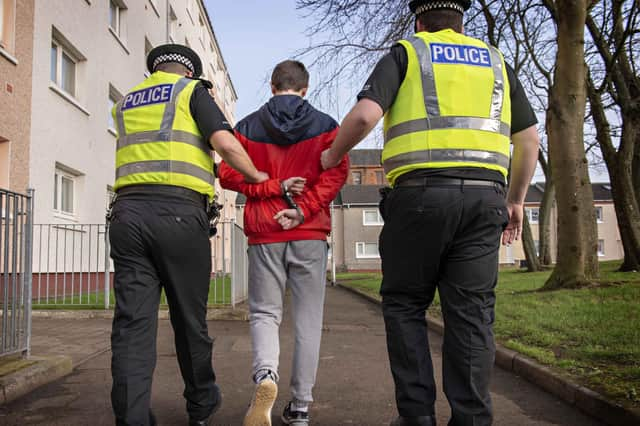Demands for radical shake-up of Scots justice system as under-18s still being treated as adults


Though falling crime rates and an emphasis on diversion have seen the number of children facing court drop dramatically over the last 10 years, one third of those who come into the justice system are still referred to the Procurator Fiscal rather than the Children’s Panel while the proportion of under-18s in Polmont Young Offenders Institution (YOI) who are on remand has risen to 67%.The CYCJ report - given to Scotland on Sunday - comes two years after 16-year-old William Lindsay killed himself while on remand in Polmont, a tragedy that prompted demands for an end to children being placed in YOIs.It also led to calls for a return to the core principles of the Kilbrandon Report - a landmark Commission into youth justice, which led to the setting up of the Children’s Hearing System (CHS). It decreed children should be treated according to their needs rather than their deeds.According to the UN Convention on the Rights of the Child, young people under the age of 18 are children. However, the CYCJ found a two-tier system, in which 16 and 17-year-olds on Compulsory Supervision Orders, or who are have ongoing involvement with the Scottish Children’s Reporter Association, are defined as children, while others are not.For most offences those defined as children have the option to be referred to the Children’s Reporter, but serious offences, or offences committed by 16 or 17-year-olds who are not defined as children, will be referred to the Procurator Fiscal and processed through the adult courts. When it comes to being placed on remand, those defined as children will (mostly) be sent to secure units, while the others to YOIs.The CYCJ researchers interviewed a range of people – including children, parents, social workers, procurator fiscals, defence solicitors and sheriffs - and discovered flaws and inconsistencies.In particular, the report highlights a failure to ensure children in adult courts understand what is going on, variations in the information available to sheriffs and the imposition of unrealistic bail conditions.As a result, the CYCJ recommends almost all alleged offenders under the age of 18 should be referred to the CHS, with only the most serious cases being referred to the Procurator FiscalAnd it calls for the setting up of specialist, child-friendly justice forums with the same standing as formal courts for children accused of serious offences. These forums should be designed to reduce the barriers to their understanding and ensure their rights are upheld.“We can continue to tinker round the edges of our adult justice system, but this is no longer sufficient to ensure procedural justice for children in conflict with the law,” said the report’s author Nina Vaswani.“Until all under 18s are legally defined as a child, and have the same access to the CHS, there will continue to be differences in how children are treated in pursuit of justice.”Those on the frontline told the CYCJ children were sometimes given bail conditions that cut them off from support networks or stopped them taking up a job offer. Lengthy periods of curfews were problematic for those with chaotic lifestyles. If an under-18, curfewed to their mother’s home, was thrown out during a row, they might find themselves in breach of the court order.
Sheriffs were less likely to remand where supervised bail was an option, but access to supervised bail differed across the country.The report goes on: “The combination of the restrictive nature of bail conditions, the lengthy court process, a lack of clarity around expectations and the unique phase of development that is adolescence, was often perceived as setting up children to fail in a system stacked against them.”
Advertisement
Hide AdAdvertisement
Hide AdWhen it came to children in YOIs, the CYCJ found that - while those who had been sentenced were likely to be involved in work and activities - those in remand could be locked up for 23 hours a day.Though some did form supportive relationships with prison officers or care staff others felt isolated and afraid. This was particularly true for “looked after” children who might receive no visits.


In terms of the court procedure, the report found children struggled to make sense of what was happening, and that they were often kept hanging around court all day. Lengthy delays were particularly damaging where the children ended up being remanded as they would arrive at secure accommodation or the YOI late, exacerbating an already traumatic experience.“For children under 18, it is a worry whether they actually get to participate because they don’t understand the language,” one defence solicitor said. “It is lawyers talking riddles, the prosecutor talking riddles and the sheriff talking riddles, and they are excluded from that.”The report concluded remand should only be used where there is no other way to keep people safe and that both bail and remand should be used for the shortest possible time.“We already have a system geared towards kids - the Children’s Hearing System - and I think we should be using that as much as possible for all under-18s,” Vaswani said.“We do recognise there might be some risky cases that are still referred to the adult system, but, where they are, we want the system that considers them to be separate, child friendly and with an understanding of the needs and rights of children.”A Scottish government spokesman said it had worked hard to keep children out of the criminal justice system by instigating measures that encourage alternatives to remand and custody where possible.
“We have seen dramatic changes in the youth justice sector since this government made a decisive shift towards prevention in 2007, including a reduction in the number of young people in custody down 87% since 2006,” he added.
“We are currently preparing a vision for youth justice priorities that will be published in early spring 2021. Its primary focus will be to keep children out of the criminal justice system.”